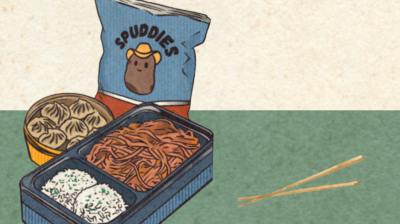Dealing with the stigma of living with Bipolar
Grace writes about her experience of Bipolar Disorder
Written by Grace McKenna
Voices - Experiences
Young people share their personal experiences.

People tend to feel uncomfortable, sometimes oddly nervous, when they learn of my mental illness. I’ve even experienced someone being frightened of me. I was 16 years old, at a college information day and surrounded by friends. I had asked about the HEAR or DARE scheme, whichever one brings down points required for a student who has medical issues is.
When the woman behind the table asked what my medical condition was, I replied, ‘I suffer from Bipolar Disorder.’ She literally backed away from the table and started stuttering ‘Uh-um-I’m not- Sarah come over here and take over’ or something along those lines. It was the most bizarre situation I have ever been in. That reaction was not what a barely recovered, now happy 16-year-old needed. In a way, I don’t blame the woman. With all the images and ideas about Bipolar Disorder that the media shows and paints (regularly using mental illness as an excuse for villains in film and television etc.…), perhaps it wasn’t an overly strange reaction. But at the time, it hit me hard. So hard, in fact, that it triggered a swing.
To those who don’t know about what exactly Bipolar Disorder is, I will try to explain without going on for pages and pages. Bipolar Disorder is a mood disorder. Just like depression, but more complex. People who suffer from it experience a wide range of emotions. Depression, anxiety, mania, and all the fantastic things that come with them. Suicidal thoughts, downwards spiralling thoughts (when you fixate on one tiny thing that happened, that might not even be a bad thing, but you view it as such, and then it’s like it makes the dominos fall, and suddenly you’re thinking about all these small little things and how horrible you are as a person, or how it has screwed up your life forever), panic attacks, anger, weepiness, paranoia, impulsiveness, giddiness, weight lost, weight gain, and many more things.
“But isn’t it just that you’re happy one minute and sad the other?”
Sadly, that is not the case. You can be sad for months. You can be manic for months. You can even be depressed and manic at the same time for months. Everyone who suffers from Bipolar Disorder suffers differently. For example, my problem doesn’t follow the same pattern I mentioned above. If something triggers me (if I forget my medication, lack of sleep, too much alcohol and major life events), I don’t get happy or sad for months. Instead, I experience what they call rapid cycling. I will go a few hours completely off my head hyper and excitable by everything and almost empty my bank account by buying things online, like that punching bag I bought that I never used.
And then I get sad. Very, very sad. It’s like someone flicks a switch. I don’t remember anything I did or said when I was high; I tend to say inappropriate things when manic, which I eventually remember and then agonise over the words, terrified I offended someone or something else. I close my eyes and all I see is all my failures, and ‘my god, I’ll never live a normal life, why bother try if I’ll always be like this.’ Then, I might experience, what I consider the most horrific part of the disorder, being high and depressed at the same time. You can’t understand it unless you’ve experienced it. It’s reassuring that some people try, but you can’t. It’s like a man telling a woman who is in labour, that he understands the pain she’s going through. This depressive-high is the worst feeling in the world. In my world at least.
“That’s impossible. How can you be depressed but happy at the same time?”
Try and imagine. You are as hyper as you’ve ever been before, talking too fast, eyes dilated and confidence coming out of your ears. And you’re also miserable. You are happy and energetic, but your brain attacks you with thoughts of how bad your poor little life is, and how everyone hates you. All the horrible thoughts and feelings you get when you’re depressed. But you’re happy. Your body is happy, your face is happy, and it’s not even like the forced happy that you put on when you’re depressed and around people. You’re genuinely happy. You’re buzzing. It feels like the blood is bubbling under your skin and you can’t keep still on your feet. And all you can think about is ‘what if I just killed myself? No one would care! I bet they think I’d never do it! Maybe I should prove them wrong. What’s the best way to do it?’
This all would go through your head in a record breaking 5 seconds. I am serious. Your thoughts move at the speed of light. And all of this, I personally believe, is the worst part of the disorder. Of course, most people who suffer don’t experience that. Like I said before, everyone experiences Bipolar Disorder different. There are even two categories. People who suffer from the other are more susceptible to hallucinations and psychosis. That, luckily, has never happened to me. With the right medication, therapy, lifestyle and support, myself and a large majority of fellow sufferers have gotten better. When you’re better no one would know, you were diagnosed with Bipolar Disorder. When you’re better, it’s easier to hide it. I could continue talking about this for hours, but I wouldn't inflict that on anyone.
The point I’m trying to make is that before you judge, understand it. Would you judge someone now for having Bipolar Disorder? Would you look down on them now, knowing the basics of what they go through? I have had my illness used against me as an insult, spread as rumours and gossip as a bad thing, and mocked. Would you use cancer as an insult? Mock it? I highly doubt it. Many people would argue that there’s no way you could compare a mental disorder with cancer. I can guarantee you, some wish they had cancer instead.
I was going to make this as a post on Facebook, but was worried it would turn into one of those things that gets tonnes of likes from people who wouldn’t even look at me twice and would probably still judge me; that would have comments pouring in about how I’m an ‘inspiration’ and ‘preach it girl!’, and could quite possible affect any prospect of a career I might have should an employer see it. Did I mention nobody will employ you if they know? I’ll leave you with that.






